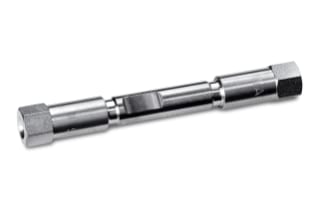
|
Chemistry |
C18 |
|
Separation Mode |
Reversed Phase |
|
Particle Substrate |
Silica |
|
pH Range Min |
3 pH |
|
pH Range Max |
7 pH |
|
Maximum Pressure |
6000 psi (415 Bar) |
|
Endcapped |
Yes |
|
Bonding Technology |
dC18 |
|
Silanol Activity |
Medium |
|
Particle Shape |
Spherical |
|
Particle Size |
3 µm |
|
Endfitting Type |
Waters |
|
Pore Size |
100 Å |
|
Format |
Column |
|
BTO Flag |
true |
|
Surface Area |
330 |
|
System |
HPLC |
|
USP Classification |
L1 |
|
Inner Diameter |
3 mm |
|
Length |
50 mm |
|
Carbon Load |
12 % |
|
UNSPSC |
41115709 |
|
Brand |
Atlantis |
|
Product Type |
Columns |
|
Units per Package |
1 pk |

Atlantis dC18 Column, 100Å, 3 µm, 3 mm X 50 mm, 1/pk
Rely on the universal, reversed-phase, silica-based Atlantis dC18 Column to retain polar compounds. Di-functionally bound C18 ligands that have been specially designed for usage with highly aqueous mobile phases, such as pure water, are used in laboratory equipment.
Benefit from the perfect balance of retention for both polar and non-polar substances by using the Atlantis dC18 Column. When compared to traditional reversed-phase HPLC columns, the Atlantis dC18 Column not only offers greater retention of polar compounds without demonstrating excessive retention of hydrophobic compounds, but it is also a universal C18 Column and entirely LC/MS compatible. Furthermore, the Atlantis dC18 Column works well with water mobile phases and has improved pH stability.
The Atlantis dC18 Column is appropriate for the separation of polar chemicals as well as other reversed-phase applications. Along with low pH stability, a longer column lifetime is also promised. The utilization of the difunctional silane bonding chemistry, which provides high stability under acidic mobile circumstances, makes this achievable.
Study the science and engineering that went into creating the Atlantis dC18 Column to find out more about its capabilities from our website. Additionally, you can purchase lab equipment directly from us using the catalog and website.
The Atlantis dC18 Column's silica-based, difunctionally bonded C18 materials make it the perfect piece of lab equipment for reversed-phase HPLC. Superior peak shape, low pH stability, resistance to dewetting (hydrophobic collapse), and improved polar component retention may all be easily achieved with the Atlantis dC18 Column. This is due to the fact that the analytical column's optimum stationary phase physical characteristics, such as end-capping, silica pore size, bonded phase ligand density, and ligand type, were integrated. The Atlantis dC18 Column is the optimum reversed-phase HPLC column for both the separation of polar chemicals and typical reversed-phase applications due to the main characteristics and production methods.
Prevent any contaminants from entering the mobile phase by using the Atlantis Silica dC18 VanGuard Cartridge, 100Å, 3 µm, 2.1 mm X 5 mm, 3/pk.
Are There Any pH Limitations For The Atlantis dC18 Column?
This particular Atlantis dC18 Column can be operated within the 3-7 pH range.
Does The Atlantis dC18 Column Have Any Maximum Pressure Limit?
The Atlantis dC18 Column listed here is able to function well with a maximum of 6000 psi (415 Bar) pressure. However, it is recommended that pressures less than the maximum limit be used to ensure the continued optimum performance of the column.